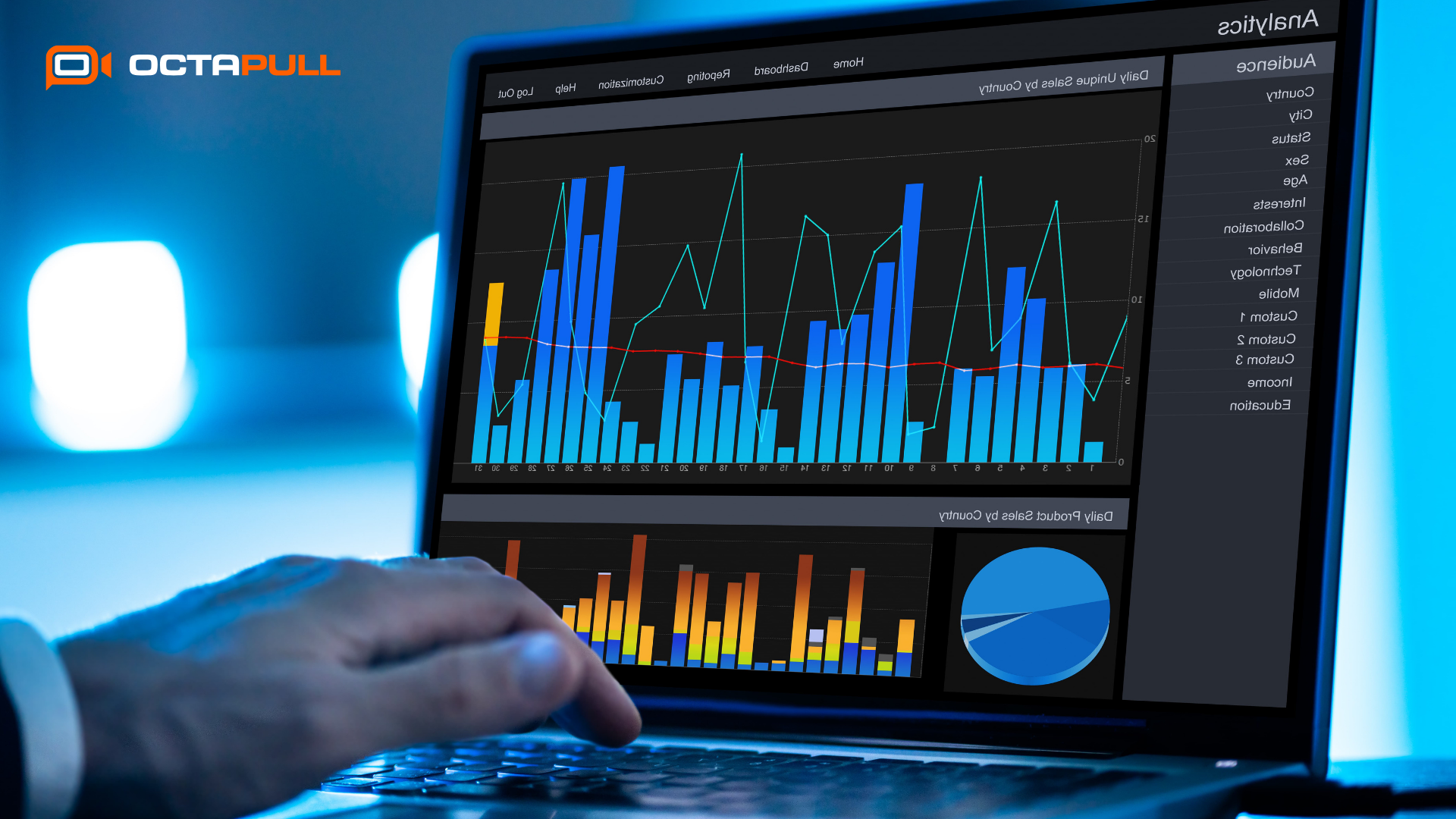Most Popular Data Analytics Software and Their Application Areas
Data analytics has become an essential part of various industries and sectors. It enables organizations to make data-driven decisions by transforming raw data into actionable insights.
Its application plays an important role in different areas of business operations such as sales, marketing, and financial management for understanding customer behaviors, and market trends and optimizing overall organizational efficiency.
In this sense, businesses have to adopt data analytics tools to collect and analyze their data effectively, identify areas for improvement, make accurate forecasting, strengthen decision-making processes, and gain competitive advantage in the market.
What Is Data Analytics?
Data analytics refers to the process of collecting and analyzing raw data, creating reports, and getting actionable insights which enable finding customer and market trends and addressing issues and questions related to the business process.
This process can vary across businesses of different industries and may require different techniques to be used. However, an effective and successful data analytics approach can help businesses conduct future predictions and strengthen their decision-making.
Why Is Data Analytics Important for Business?
Data analytics has a crucial role in transforming and supporting business operations in various fields, including sales, marketing, financial management, and operational processes.
Sales
Businesses can collect sales data from automation tools, CRM software, and e-commerce platforms and analyze such data using predetermined data metrics.
This way, they can get insights into customer behavior, market trends, and overall sales performance, facilitate making informed decisions about marketing, product development, and sales efforts, and gain a competitive advantage in the market.
Marketing
Data analytics in marketing enables businesses to better understand user interactions, optimize marketing strategies, and campaigns accordingly improve their customer experience, and enhance sales performance.
To do this, businesses can gather and analyze data from various channels, including their web pages, social media, mobile apps, and other digital platforms that offer insights into user interactions.
Financial Management
Data analytics in financial management focuses on assessing the financial health of a business and enhances the effectiveness and accuracy of financial processes.
By getting insights through analyses, businesses can strengthen informed decision-making, evaluate performance to ensure stability, identify risks, optimize budgeting and forecasting, and conduct strategic planning to gain competitive advantage.
Operational Processes
Data analytics in operational processes focuses on monitoring and optimizing the efficiency of businesses’ daily operations by analyzing large volumes of data from various sources such as devices, systems and business networks.
This way, they can get insights that allow identifying necessary process improvements, reducing costs and expenses, streamlining operations, and fulfilling customer demands by responding to market dynamics.
Most Popular Data Analytics Software Solutions
Google Analytics
Google Analytics is a self-service data analytics tool that allows businesses to better understand visitor interactions by embedding a Javascript code into their web pages and creating reports based on analyzed data.
It offers data visualization capabilities, customizable dashboards and reports, mobile and website analytics, and integration with other analytics tools.
Collecting and analyzing information related to visitor actions on the business web provides especially marketing teams with insights into the behavior, location, and demographics of the target audience.
Google Analytics is a free-to-use platform that is suitable for businesses that do not need or afford advanced analytics tools. However, it offers limited customer support and relies on third-party training as a disadvantage.
Power BI
Microsoft Power BI is one of the most popular data analytics platforms. It supports various data sources and allows businesses to visualize data, and create and share reports and dashboards.
Additionally, it is possible to build automated machine-learning models. Integrating with other dashboards and reporting tools as well as Azure Machine Learning, Power BI acts as a central data analytics platform.
It also supports a wide range of features, including data visualization, and predictive analytics capabilities, and offers regular updates and mobile apps.
Businesses can choose between the free version and paid commercial versions, which start from 10 dollars. As a disadvantage, the free version has data limitations and may slow down if businesses work with large volumes of data.
Tableau
Tableau is one of the data visualization and analytics tools businesses can use for business analytics and business intelligence, analyzing and presenting data in a structured and easy to understand.
It allows businesses to create reports, dashboards, and worksheets and share them on various platforms, including desktop and mobile applications and web browsers.
Tableau offers user-friendly dashboards and visualization components that enable drag-and-drop features. It speeds up processes and reduces the need for end-user performance optimizations.
Tableau is only available for commercial paid use and license plans start from 35 dollars and can go up to 115 dollars. Lack of advanced SQL queries, data pre-processing capabilities, and better version control are among its disadvantages.
Excel
Microsoft Excel is a commonly used data analytics tool used to manipulate data and offer insights based on its analytics capabilities. It is developed on the base of Visual Studio and is virtually compatible with any standard analytics workflow that requires simple analysis processes.
It provides businesses with quality-of-life features such as spreadsheet and workbook sharing, real-time collaboration, data extraction and cleaning, free templates, and easy data input.
Although it has gained modern features over the years, Excel is not suitable for complex data analysis processes of business and has limitations that do not allow big data analysis.
Excel only offers a commercial license and can be used either through Microsoft 365 along with other Office applications or as a standalone application, which is available for 179 dollars.
Additionally, businesses may occasionally come across miscalculations, data handling errors, and insufficient security features. Hence, cloud-based SaaS tools offer better features for businesses that deal with large volumes of data.
Apache Spark
Apache Spark is an open-source data analytics tool that businesses can use for big data processing, data engineering, machine learning, and AI training.
Splitting big data into nodes or smaller volumes makes dealing with larger data in a way that is easier and faster.
In addition to its advanced analytics capabilities, it offers multilingual support, a user-friendly interface, and integration with other data analytics tools.
It allows faster data processing in comparison to other tools thanks to its data allocation on RAM instead of local memory.
Despite being available for free, Apache Spark does not offer file management, Rigid UI, and large number of algorithm sets. Nevertheless, it is a strong tool that is often preferred by data analysts and scientists.
Zoho Analytics
Zoho analytics is an analytics tool that allows small and middle-sized businesses to analyze and manage data in an effective manner.
With its mobile application support, dashboards, AI features, and integration capabilities, businesses can conduct dynamic data analysis and data preparation.
Zoho Analytics offers a free version and commercial use options starting at 24 euros and the pricing goes up with each additional user. The platform offers on-premises and cloud use options.
However, it offers limited data visualization, manual data exportation to cloud platforms, and manual data synchronization, as for disadvantages.
Choosing the Right Data Analysis Tool: What to Consider
Businesses must consider various factors before choosing the right data analytics tool for their workflow. These factors include organizational needs, scalability goals, customer support, integration capabilities, and cost-effectiveness.
Identifying Needs
When choosing the right, it is crucial for businesses to first identify their needs, which include:
- Focusing on the department (sales, marketing, finance, and operations)
- Considering teams’ technical expertise and tools they are already familiar with and willing to learn
- Considering recent trends to provide more value to teams
Scalability and Flexibility
As working with big data has become prevalent, businesses deal with much larger volumes of data, convert it to different formats, and process in real time.
In this sense, businesses must choose the right tool that aligns with their big data needs and requirements and consider the scalability and flexibility needs of organizations and teams.
Customer Support
Occasionally, businesses may encounter errors and issues. Hence, using a tool with reliable customer support and a supportive user community can be beneficial to overcome these challenges.
Integration Capabilities
If the new tool is not compatible with the existing tools teams and businesses use, it will cause issues, and the workflow will be negatively impacted.
Therefore, businesses must check integration features and ensure the data analytics tool is compatible with existing business software, including relationship management (CRM), resource management planning (ERP), sales force automation (SFA), databases, and cloud storage services.
Cost and Budget Limitations
Different tools offer various functionalities and prices greatly vary. Although some have free and cost-effective plans, others may have higher costs with possible yearly subscription requirements.
For this reason, businesses should thoroughly evaluate their needs,the structure of the tools and make sure they align with their needs and budget.
Octapull SFA Supports your Sales and Marketing Operations
Octapull SFA provides businesses with advanced features and data analysis capabilities which are necessary to conduct their operations more effectively and increase their growth potential and success.
With its business intelligence (BI) and finance modules, businesses can effectively manage their important data in sales, marketing, and finance departments and increase overall operational efficiency.
These features include:
- Multi-channel Campaign Management: Easily create and manage campaigns on multiple channels simultaneously. Offer effective and personalized campaigns to specific customer groups with segmentation using advanced data analytics.
- Transaction Management: Allow clients to make payments using cash, card, check, and direct bank transfer methods. Track income and expenses and other financial data from Octapull SFA as a central platform.
- Easier Risk Management: Segment sales based on risk limits and close deals securely. With effective risk management, maintain the stability and sustainability of your business.
- Effective Reporting with BI Module: Access data in real-time, regularly monitor performance, and create specialized reports according to KPIs and metrics using dynamic reporting features to improve decision-making processes.
- On-premises and SaaS Installation Options: Choose between local (on-premises) and cloud (SaaS) installation options according to the needs and structure of your organization and network.
- ERP and Third-Party App Integration: Integrating with other business software, organizational data, and financial information is stored securely, eliminating concerns related to compatibility and confidentiality.
Octapull B2B for your Data-Powered Business Development Processes
Octapull B2B offers businesses a powerful platform to strengthen their sales operations.
By enabling them to monitor sales and financial information and track orders, delivery and stocks using advanced analytics capabilities, it contributes to increasing satisfaction and recurrent sales.
Advantages of Octapull B2B include:
- Financial Management: Efficient financial management allows current account and business balance information to be monitored in real-time.
- Easier Transactions: Clients can complete the payments of their orders instantly using virtual POS or direct bank transfer options.
- Risk Limits and Safe Sales: Tracking customer orders in real-time enables enterprises to forecast potential risks and conduct sales operations in a secure manner.
- ERP Integration: Enterprises can manage all their operations, including order management, inventory checks, and financial processes from a single platform, faster and more efficiently.
- Effective Campaign Management: Managing multichannel campaigns effectively, minimum sales limits can be set.
OCTAPULL supports businesses with its robust and innovative solutions to support sales operations and marketplace success.
Seamlessly integrating with our video conferencing solution, OctaMeet, businesses can manage their operations and daily communications from a central platform.
Sign Up OctaMeet for Free Today
If you would like to get more information about our products Octapull SFA and Octapull B2B, you can visit our website by clicking here or schedule a demo meeting with our product team.






